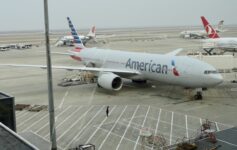Delta will impose a strict new ban on emotional support animals on longer flights, effective next week. The carrier will also tighten restrictions on service animals next year.
While the carrier already tightened its emotional support animal policy earlier this year, it has now banned emotional support animals on flights longer than eight hours. Furthermore, both emotional support and service animals under four months of age will not be allowed onboard a Delta flight (regardless of flight length) starting in February.
Emotional Support Animals Banned On Flights Longer Than 8 Hours
The ban on emotional support animals on longhaul flights seeks to balance the needs of travelers with their safety. John Laughter, Senior Vice President – Corporate Safety, Security and Compliance, explained:
We will continue to review and enhance our policies and procedures as health and safety are core values at Delta. These updates support Delta’s commitment to safety and also protect the rights of customers with documented needs – such as veterans with disabilities – to travel with trained service and support animals.
As I’ve covered before, Delta reported an 84% increase in incidents involving service or support animals in 2016-17. Delta articulates its policy changes is within the law and a necessary step to protect innocent customers.
Customers who purchased tickets prior to December 18, 2018 who have already requested to travel with an emotional support animal will be allowed to travel as originally ticketed. That means you still have one week to book your emotional support animal on a longer flights.
Service + Support Animals Less Than Four Months Old Banned
In a less controversial move, Delta will also ban any service or support animal who is less than four months old. That is merely a reflection of the amount of time it takes to train a dog or other animal to be well-behaved onboard an airplane. That policy does not kick in until February 01, 2019.
CONCLUSION
I’m very much in favor of these changes and hope that United and American move to quickly match them. The pendulum swung too far in the direction of travelers with emotional support pets, allowing abuse of the system. These new reasonable policies will draw us back toward a more equitable compromise.
> Read More: Bravo! Delta Restricts Emotional Support Animals





Slow clap
Every time I fly through ATL, I always travel with my emotional support chicken. Sometimes it’s from Popeye’s….sometimes it’s from Bojangles.
I applaud Delta but that’s not enough. Actual service animals (for the blind and wheel chair bound) should always allowed aboard but these animals are never less than a year old. It takes a long, long time to train such animals. “Emotional support animals”, well that’s just a scam. They should all be banned from the cabin.
Emotional support animals should pay airfare. Human emotional support animals pay unless they are on your lap and under 2 years old. Case in point: if you’re child is suddenly away from you, you become worried. Therefore, you get emotional support from them. Yet, kids have to pay airfare.
I tend to agree.
Psychiatric service animals need to become a thing, and they should require training like other service animals do. Many veterans with PTSD are benefiting from what is now called an emotional support animal. Since PTSD is a valid and debilitating medical disease the animals that make life possible for people with it and other severe psychiatric disorders need to be allowed. We should have high standards for service animals, both for physical and psychiatric disabilities. Limiting psychiatric service animals to trained animals for severe psychiatric illnesses would still address the abuse by people who are flying with a pet that they perhaps cannot afford to pay to take along. (The prohibitive high additional charges for traveling with pets is likely the real cause of the increase in illegitimate emotional support animals. That also needs to be addressed, but is another issue.)
Psychiatric Service Animals are already a thing. The difference between an ESA and a PSD is that the latter is task-trained to assist a person with their psychiatric disability, which is the true definition of a service dog in general; this can be by interrupting self-harm, reminding of and bringing medications, applying deep pressure therapy, body blocking, among many others. PSDs qualify as much as any other Service Dog but sadly they are the most confused with “Emotional Support Animals.” I still see too many people mislabeling their ESA as a “Therapy Dog” or a “Service Dog.” If they are thoroughly task-trained to assist their handler with a disability and pass public access requirements, they are a Service Dog… period!
The US DOT Air Carrier Access Act states: “For a flight that is scheduled for eight hours or longer, airlines may require documentation stating that your animal will not need to relieve itself, or can do so in a sanitary way.”
I am not commenting on whether Delta’s new rules are good or bad, however, Delta is opening themselves up to litigation with banning ESAs on flights 8 hours and longer. Such a restriction contradicts the Act.
What protection is there for passengers with severe allergies to animals?
They ban peanuts from flights if someone is allergic, even warning passengers that they must not open their own food packages if it contains peanuts. They should have the same consideration to people with severe animal allergies like my son. I will definitely sue the airline if they allow an “emotional support animal” aboard if my son reacts to it. I’ll record video evidence of the harm the airlines are doing when they allow these animals aboard. Once they lose millions in lawsuits, they’ll stop these scam animals from the cabin.
Take medicine or don’t fly,
As a service dog trainer I approve of these changes whole-heartedly. Thank you, Delta! There is no such thing as an SD under the age of 1-2, in most cases two years or slightly more. It takes an incredible amount of work to train these dogs to pass public access requirements and thus bringing young dogs on board is important so that they get exposure… but it doesn’t have to be earlier than four months if the handler/trainer is properly socializing them in all other aspects of life. Furthermore, we all know that ESAs, whether legitimate or not, can cause problems for real service dog teams. These include invisible disabilities that are very real so please do not automatically judge a SD as “fake” if you cannot externally see what is ailing the handler. Restrictions are necessary otherwise planes might as well be flying pet stores.
It’s a start.
There’s a world of difference between a service animal e.g. a guide dog for a blind person and the training that dog will have had and an ’emotional support animal’ which has had the misfortune to be adopted by a mentally unstable person.
I have no problem with the former in any environment but will not tolerate the latter on an aircraft or indeed any other place where animals may not be permitted.
It’s still not enough. Just ban emotional support animals totally. The only animals that should be in the cabin should be for VISIBLY handicapped people (blind, mentally-disabled), not everyone who can’t “cope” with life. If you need emotional support when you fly, then get a human companion to travel with you or bring a comfort pillow or stuffed toy to hold onto. Thanks to the abusers, this is the result.
I was seated next to a college student who had a ESA because she was afraid to fly. She took medication and promptly fell asleep. This 65 pound dog moved to the area under my seat and took my leg and foot space. (I am handicapped) i could not get the dog to move. The FA said they could do nothing. I do not believe the girl needed the dog, she told me she just wanted to take the dog to college so she would “feel better”. If that is the criteria, everyone could claim they need one.
You people have to understand that for most of dogs owner they are like our kids.
We have been traveling with dogs for 60 years and now getting impossible because airlines make things complicated.
I have to travel to Paris every two months for work and I do take my dogs with me.
There is never been so much space in business and dogs are banned?
I have to endure kids with no education and passengers with no hygiene when my 8 pounds yorkie doesn’t make a noise of the travel?!!!!
Passengers with dogs should be noted like Ubers. Companies can impose dippers and closed bags but no ban.
This ban is outrageous !!! Goodbye my Delta Platinium I will fly with more clever companies
The equation of dogs to human children is an odd movement of acceptance over the last twenty years. People are not dogs, they are not children, they are not like children. They are animals, lovely as they may be, just animals and not people.
I realize I am late to the party with this one, but I wanted to share my recent experience with my new ESA. My first dog, who was not an official ESA, was a male Yorkie, who flew with me several times a year from the time he was 6 months old to age 5 in an airline approved carrier, which was always kept under the seat. Back then (2009), there were no additional charges and his carrier counted as a carry on bag. From the beginning, he was an amazing travel companion. Never made a sound or had any accidents in his carrier. When he was 3 years old, I was diagnosed with Major Depressive Disorder and Generalized anxiety disorder. Unfortunately, I had to move out of my home in June 2019 due to a divorce, and after several months of trying, I could not find any place to rent that would allow me to keep him. It broke my heart and made my latest relapse with my mental health, which happened in January, even more difficult to handle. For 10 years, he WAS my ESA, and up until a few months ago I didn’t even know such a thing existed until my therapist told me about it.
Luckily, my boy was very quickly adopted by an amazing family, thanks to a Yorkie rescue group in the area. But even though I had letters from my psychiatrist, and all the requirements to make him an official ESA, I could not take him away from his new family. So I found another Yorkie pup and immediately began training her. Unfortunately, my Mom was diagnosed with Stage 3b cancer just a few weeks after I brought my new dog home, and I needed to get back to my childhood home. Since my new puppy is less than 4 months old, and I had no one to take care of her or the ability to board her due to her age and my finances, I had to find an airline that would allow me to bring her aboard as an ESA WITHOUT an age restriction, which was Frontier.
Since she hasn’t had all of her vaccines yet, I had no plan to take her out of her carrier, unless she was crying or being disrupted. But just like my boy, she was quiet as a mouse and no one even noticed she was there. Despite the 3 1/2 hour flight, she made no attempt to escape, whine or soil her carrier. I flew Delta on the way back, but since she was only 13 weeks, when we returned home last week, I was forced to pay the $125 fee to bring her onboard, even though she remained in her carrier for both legs of the flight and the layover in LA, except to ise the pet relief area, which she should have been no where near, but I know she needed to relieve herself.
I understand the restrictions, and I can’t imagine bringing a large dog on board an airplane, but the fee is really uncalled for in many instances. Especially mine, which a small, well behave dog that just so happens to still be a pup. I may as well had my backpack under the seat, which Delta did not charge me extra for. (Frontier DOES charge for carry on bags ironically enough but not for ESA dogs). Plus, Yorkies are hypoallergenic, so no harm to those allergic to dogs. Maybe the airlines should tighten up the size and breed restrictions rather than full on bans and unnecessary charges? I am either blessed to have found a breed that is not only good for emotional and physical support of my illnesses, or I am just good at training them to behave, either way, the only restriction that would affects me would be the 8+ hour flights. But I would rather put her in a doggy hotel once she is fully vaccinated rather than subject her to being on a flight that long anyway.